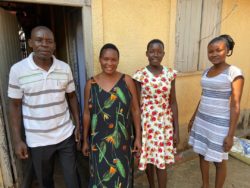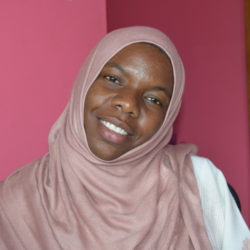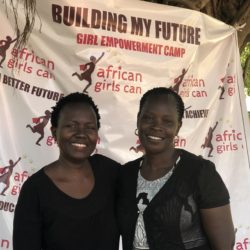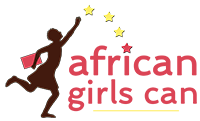
Localization is more than just a buzzword or a trend – it is how development should take place and how it will happen in the future. It essentially means providing local solutions to local problems. Less than 1% of global development assistance in 2018 reached local, community-based organizations. Entities such as Amplify Girls aim to change that.
Amplify encourages collaboration. Partnerships between like-minded organizations doing the same sort of work are the key to success. There is so much we can learn from one another.
Amplify Girls hosted a panel of experts on localization, “Localization is Community Driven Development,” on June 21, 2022, which was the 3rd annual World Localization Day. Representatives from the following East African organizations shared their localized approach to building girls’ agency, while African Girls Can and other Girls’ Education organizations listened in.
Girl Up Initiative (GUIU)
Community and youth centric interventions, including adolescent girls and vocational programs and working to change the attitudes of boys, in inner city Kampala, Uganda.
Girls Livelihood and Mentorship Initiative (GLAMI)
Leadership and life skills programs with professional mentoring for secondary school girls at 25 schools in Northern Tanzania. GLAMI is preparing to expand to another district. AfricAid is the US funding organization for GLAMI.
Women’s Institute for Secondary Education and Research (WISER)
A school in a rural setting of Western Kenya that provides high-quality girls’ education, holistic health resources, and community-oriented support.
Streets Ahead Children’s Centre Association (SACCA)
Rehabilitation of street children and program to prevent them from reaching the streets in the first place, Eastern Province of Rwanda.

Joan Atimango, a Program Officer and digital storyteller at GUIU, reminds us that every girl has a whole community around her. Therefore, different stakeholders, including her family, her school, boys she interacts with, and religious and community leaders must all be included in programming.
Joan adds that skilling and employability is critical. There is no sustainability if organizations simply give out materials. After being at home for so long during the pandemic, many girls (and youth in general) have decided they don’t want a formal education. They need a way to earn an income.
Grace Murika, Country Manager for WISER, points out that centers of power and contexts are continuously changing, especially during a crisis such as the Covid pandemic. Empowering the community and trusting in them is key. For example, during the pandemic local fishermen were not allowed to fish and families could not put food on the table. WISER pivoted to provide relief packages (African Girls Can did this too).

Asimwe Suedi, Director of Programs for GLAMI, explains that all local and community driven organizations exist to address specific challenges of a community. Cultural values and political practices must be understood in each location and the goals of the organization should be aligned accordingly. The process of addressing social and economic challenges is different all over the world.
Asimwe further asserts that organizations must shift their mindset and attitude from full dependency and leverage available community resources and capacities. Asimwe says, “If we always seek a completely new resource, we will be told what to do and how to do it. We don’t have to fully depend on others to invent a new solution, which will need even more funds to be successful or realistic. What strengths are already there at the local level to fill the gaps we have identified?”
African Girls Can – Connecting the Dots

The work that takes place in Uganda has, from AGC’s inception in 2016, been designed and implemented entirely by Ugandan women. This includes selection of the girls to receive scholarship funds and supplies, mentoring those girls at school, running empowerment camps (including identifying speakers and facilitators) and parent engagement meetings, and vetting quality post-graduate options (nursing and other vocational schools). Most importantly, the organization has a Teacher Liaison, Jennifer Nyakober, who lives near the school and knows the girls, their families, and their circumstances very well.
The response to Covid, in particular, was entirely localized. What did our girls and their families need during this stressful time? In addition to the packages of food and supplies, Phoebe and Jenny first organized radio programs (with important information that reached the entire community) and, later, the distribution of tablets so that the students could access e-learning. Learn More.
African Girls Can in the United States exists only to communicate the challenges and successes happening in Uganda and reinforce AGC’s role as a member of the global girls’ education movement. Alecia McClure, Co-Founder of AGC, says “I have felt that one of my main jobs with AGC is to connect the dots between people who strongly believe in the power of girls’ education (and would like to invest in this area) with some girls who otherwise would not have the opportunity to continue their schooling. So, I raise funds, which are then wired directly to educational institutions. I also love writing letters to the girls as a group – I welcome new girls and cheer them all on at exam time.”

